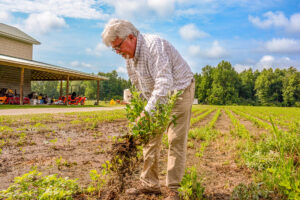
Jimmy Stevens is the owner and operator of Stevens Produce and Grains in Whiteville, North Carolina. Photo by Linda Gerron, FSA.
The Redemption Story of a North Carolina Farmer
By: Linda Gerron, FSA North Carolina
Through no fault of their own, our nation’s farmers and ranchers have faced incredibly tough circumstances over the last few years. That includes James “Jimmy” Stevens of Whiteville, North Carolina, who is one of the more than 20,000 producers who received life-changing, transformational support from the U.S. Department of Agriculture (USDA). The Inflation Reduction Act (IRA) provided $3.1 billion for USDA to deliver expedited assistance to distressed borrowers with certain Farm Service Agency (FSA) direct and guaranteed loans whose agricultural operations were at financial risk. USDA has provided approximately $1.1 billion in immediate assistance for distressed borrowers to help make them current.
This has helped producers like Jimmy who were at risk of losing their operations due to several unprecedented challenges, including trade disruptions, a worldwide pandemic, continued impacts on input costs and markets, and more frequent, more intense, climate-induced natural disasters.
Jimmy owns and operates Stevens Produce and Grains, a business he has gradually developed since his younger years. He had the love of farming instilled at a young age since both of his parents were tobacco farmers. When he was 17 his dad passed away, and for the next 20 years, Jimmy and his mother continued farming tobacco. Over the years, his mother’s health slowly deteriorated, causing Jimmy to leave tobacco production and grow alternative crops – green beans and corn.
“I knew that as long as we were farming tobacco, momma was going to be in it, and her health wasn’t where it needed to be for her to be doing that,” Jimmy said.
In 2019, Jimmy ventured into the bell pepper, garlic, and peanut production. But as alluring as farming can be, it has its challenges. By the end of 2019, farmers and ranchers nationwide reported financial distress due to years of challenging production and market conditions, both of which the COVID-19 pandemic further exacerbated in 2020.

Jimmy transitioned his family’s farm from tobacco production to growing a variety of crops, including peanuts. Photo by Linda Gerron, FSA.
Jimmy’s deals with local vendors and food stores fell through when they purchased 50 percent or less of what they had agreed, causing him to fall behind on debt payments. In 2021, Jimmy experienced yet another setback when the pressure cooker he used to boil his peanuts exploded, spewing hot liquid and steam onto his torso and arms. Due to the severity of his burns, doctors expected Jimmy to stay in the hospital for six weeks or more. Fortunately for him, he was released after 16 days – something described as a miracle by his nurses.
“I remember it as if it had happened five minutes ago,” Jimmy said. “It was like a mirror of scalding water coming my way; it covered me with third-degree burns in about 48 percent of my body.”
“You just don’t know how bad it was to have a loan and not be able to repay it while recovering,” he added. “It’s a lot on you and your work, especially when you try, and you know, things don’t work out.”

After a few setbacks caused financial strain, assistance received through the Inflation Reduction Act has allowed Jimmy the opportunity to continue his passion for farming. Photo by Linda Gerron, FSA.
With his FSA farm loan made current by the Inflation Reduction Act, Jimmy was given a once-in-a-lifetime opportunity to continue his passion for farming without the lingering cloud of debt. Nowadays, you can find him working on his soybean or peanut farms, the latter of which he plans to sell as pressure-cooked peanuts at local convenience stores and his produce stand.
“I’m going to try to continue to grow my peanuts,” Jimmy said. “And continue to pay whatever else I’ve accrued since then. That’s all I want; I don’t even care if I die with just a little bit of money. I’m so fortunate that USDA helped me out, and I sure do appreciate it.”
More Information
On August 16, 2022, President Biden signed the IRA into law. Section 22006 of the IRA provided $3.1 billion for USDA to provide relief for distressed borrowers with certain FSA direct and guaranteed loans and to expedite assistance for those whose agricultural operations are at financial risk. The IRA has provided an opportunity for USDA to both address the immediate need of distressed borrowers and design a better path and process for distressed borrowers. Learn more about IRA assistance for distressed borrowers.
For more information on this story, contact Linda Gerron, communications coordinator for the Farm Service Agency in North Carolina.





